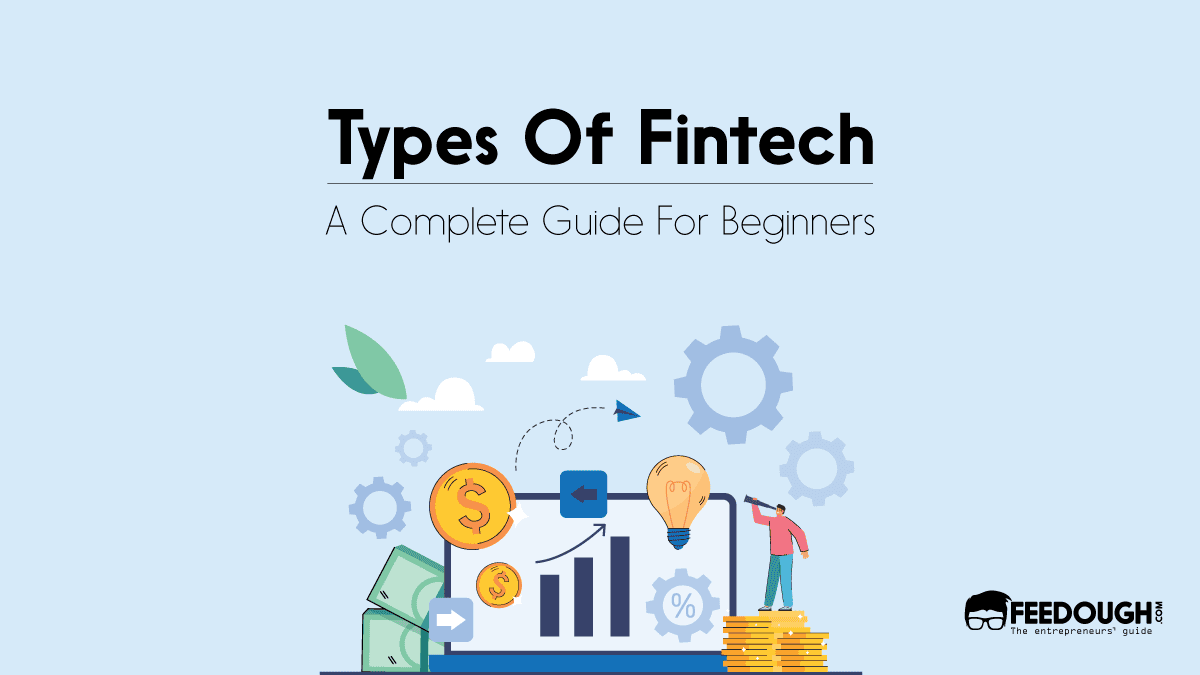The internet, AI, and other innovations like blockchain have revolutionised the world of finance. The norm of being physically present for all financial transactions is now outdated. There are people with fully operational bank accounts, stock portfolios, and other financial assets who have never been to a physical bank branch once.
This is made possible by fintech companies.
These companies have disrupted the entire financial industry, be it banking, investment, insurance or others, by incorporating technology into their operations.
But what is a fintech company, and what are the types of fintech companies that exist today?
What Is Fintech?
Fintech, short for financial technology, refers to the use of technology to improve and automate financial services, be it for individuals or businesses.
It includes everything from developing new software to incorporating new algorithms and using AI and machine learning to create more efficient financial processes.
A fintech company is different from a traditional financial institution. It is highly integrated with technology and focuses on providing innovative financial services through technology.
Moreover, several fintech companies don’t have consumer dealing at all; instead, they offer services to traditional financial institutions.
Types of Fintech Companies
Fintech is a broad term encompassing a broad range of companies and services. These companies can be categorised into several fintech companies with their own subtypes.
Here’s a breakdown of the main types of fintech companies:
Core Fintech Sectors:
- Digital Payments
- Digital Banking (Neobanks)
- Personal Financial Management (PFM)
- Wealth Management (WealthTech)
- LendTech
- Trading and Investment
Additional Fintech Sectors:
- Blockchain and Cryptocurrencies
- Insurtech
- Regtech
Core Fintech Sectors
The core fintech sector includes fintech companies that directly deal with consumers. These types of fintech companies provide services like digital payments, banking, personal financial management, wealth management, and lending.
Digital Payments
Digital payments refer to transactions made electronically, bypassing the need for physical currency. This type of fintech constitutes various methods of electronic payments, including online banking, mobile payments, digital wallets, and peer-to-peer (P2P) payment platforms.
Digital payments companies are disrupting the traditional banking system by making financial transactions more convenient, secure, and cost-effective for consumers. For example, customers can now pay for goods and services online or transfer money to friends and family with just a few clicks on their smartphones. This wasn’t possible a few decades ago and has significantly changed how consumers handle money.
Such types of fintech companies rely on technologies like encryption, AI, and machine learning to provide secure and seamless payment solutions. Encryption ensures the transactions are secure, AI facilitates fraud detection, and machine learning helps personalise user recommendations.
There are several subtypes of digital payment companies. Some of them are:
- Mobile Payment Companies: These companies provide payment services through mobile applications, enabling users to pay for goods and services using their smartphones. For example, Apple pay, a subsidiary of Apple Inc., allows users to pay for purchases using their iPhones or iPads. Similarly, Google’s mobile payment service, Google Pay, enables Android users to make contactless payments through their smartphones.
- Online payment gateways: A payment gateway is a technology that acts as an intermediary between the customer and the merchant. It securely captures and encrypts credit or debit card information, authorises transactions, and facilitates fund transfers from the customer’s account to the merchant’s account. PayPal, Stripe, and Square are popular examples of online payment gateways.
- Digital Wallet Companies: Digital wallets are virtual wallets that hold payment information and can be used for online or offline transactions. For example, a user may store their credit or debit card information in a digital wallet and use it to make purchases online. Some popular digital wallets include PayPal, Apple Pay, and Google Wallet.
- Peer-to-Peer (P2P) Payment Platforms: P2P payment platforms enable individuals to transfer money directly to each other without the involvement of a traditional financial institution. These services are often used to split bills, send money to family and friends, or pay freelancers. Examples of P2P payment platforms include Venmo, Zelle, and Cash App.
Digital Banking (Neobanks)
Digital banks, or neo-banks, are online-only financial institutions that offer banking services through digital platforms. These banks have no physical branches and rely on technology to provide their customers with a seamless and convenient banking experience.
These banks disrupt the finance industry by providing streamlined, cost-effective, and innovative services such as budgeting tools, real-time transaction tracking, and 24/7 customer support. They often have lower fees and higher interest rates compared to traditional banks, making them an attractive option for consumers.
Digital banks’ main focus is mobile banking, and their apps offer various features, such as remote check deposits, bill payments, and money transfers.
By being online-only they take banking facilities to places where traditional banks cannot reach, making financial services more accessible to underbanked populations.
There are several subtypes of digital banking companies:
- Full-Service Neobanks: Online-only banks that offer a complete range of banking services like checking and savings accounts, loans, and investment products. Examples include Chime and Revolut.
- Specialised Neobanks: Digital banks that provide specific financial services or customer segments. For example, Aspiration offers banking services with a focus on ethical and sustainable investing, while Monzo targets tech-savvy millennials with its intuitive app and budgeting tools.
- Banking-as-a-Service (BaaS) Providers: These are platforms that provide the backend infrastructure for other companies to offer banking services. Examples include Solarisbank and BBVA’s Open Platform.
Personal Financial Management (PFM)
Personal Financial Management (PFM) refers to digital tools and apps that help individuals manage their finances more effectively.
These services and tools provide insights into spending habits, help with budgeting, track savings, and offer advice on how to achieve financial goals.
PFM companies are on the rise as more people are becoming interested in managing their finances efficiently. They often aggregate financial data from various accounts, such as bank accounts, credit cards, investments, and loans, and use their proprietary algorithms to provide customised financial advice and insights.
These companies rely heavily on AI, machine learning, and data analytics to provide users with accurate and useful financial recommendations.
Even PFM companies have several subtypes. They include –
- Budgeting Apps: Apps like YNAB (You Need A Budget) and PocketGuard help users plan their spending by setting budgets and tracking expenses
- Expense Tracking Tools: Companies like Mint and Expensify automatically track and categorise expenses from linked accounts. Then, they provide insights on spending patterns and recommendations for saving money.
- Investment Management Platforms: Platforms like Personal Capital and Quicken provide tools for managing investments and planning for future financial goals.
- Debt Management Apps: Apps like Tally and Debt Payoff Planner help users manage and pay off debts more effectively.
Wealth Management (WealthTech)
Wealth management, often referred to as WealthTech, refers to the use of technology to improve and automate the processes of –
- Financial planning
- Investment management and
- Advisory services
In simple terms, wealthtech companies use technology to help individuals and businesses manage their wealth, investments, and financial goals better.
They do this by making investment services more accessible and affordable to a broader audience. For example, a company like Betterment, a robo-advisor, uses algorithms to automate and optimise the investment process for their clients.
This service was previously limited to high-net-worth individuals due to the high fees charged by traditional wealth management firms.
Like other fintech subcategories, wealth management also includes several types of companies. They include –
- Robo-Advisors: Robo-advisors refer to digital platforms that use algorithms and data to provide automated investment advice, portfolio management, and other financial planning services. Some examples of robo-advisors include Betterment, Wealthfront, and Acorns.
- Automated savings: Automated savings apps use technology to help individuals save and invest money in a disciplined and automated manner. These platforms often round up users’ purchases to the nearest dollar and invest the difference in a portfolio of their choice. Examples include Digit, Acorns, and Qapital.
- Investment Platforms: Investment platforms offer users access to different investment options such as stocks, bonds, mutual funds, and exchange-traded funds (ETFs). These platforms are often user-friendly and allow individuals to manage their investments without the help of a financial advisor. Examples include Robinhood, Stash, and E-Trade.
However, wealth management fintech companies differ from personal finance management fintech companies as they focus specifically on helping individuals manage and grow their wealth. While personal finance management companies may offer budgeting tools and expense tracking, wealth management companies often provide investment advice and portfolio management services.
Trading and Investment Technology
Trading and investment fintech companies are a type of fintech company that includes platforms and tools allowing individuals and institutions to buy, sell, and manage financial assets.
These companies have disrupted the traditional brokerage model by:
- Democratising access to financial markets: Fintech platforms have made it possible for individuals to buy and sell stocks, bonds, and other assets with low or no fees.
- Offering advanced trading tools: Fintech companies have also introduced advanced tools such as automated trading algorithms, real-time market data, and social trading features that allow users to copy the trades of successful investors.
They have also allowed individuals to engage in peer-to-peer lending, crowdfunding, and other alternative forms of investment.
- Providing personalised investment advice: Robo-advisors, a type of fintech company, use algorithms and technology to provide personalised investment recommendations based on an individual’s risk tolerance and goals. This has made professional investment advice more accessible and affordable for the average person.
- Making online brokerage and trading more convenient: Several fintech companies like Robinhood and eToro have mobile apps the at allow users to trade and manage investments on-the-go. This has made the process more convenient and accessible for busy individuals.
- Stock monitoring and analysis: Some fintech companies offer platforms that allow individuals to track and analyse their stock portfolios in real time. These tools provide insights and recommendations for portfolio rebalancing and diversification. Some examples of these tools include StockCharts, FinViz, and TradingView.
- Enabling social trading: Some companies enable users to follow and copy the trades of experienced investors. For example, companies like eToro and ZuluTrade allow users to see the performance of top traders and automatically copy their trades.
- Making investment education more accessible: Fintech companies have also made investment education more accessible through online courses, webinars, and educational resources. Some companies also offer virtual trading platforms where individuals can practice investing without risking real money. For example, Investopedia’s Stock Simulator allows users to trade using virtual money based on real market data.
LendTech
LendTech, or lending technology, refers to a type of fintech company that utilises technology to streamline and enhance the lending process.
Traditional lenders often require a lot of paperwork and lengthy approval times, making the process time-consuming and cumbersome for borrowers. LendTech companies aim to change this by digitising and automating the lending process, reducing paperwork and cutting down on approval times.
Some ways in which lendtech companies are revolutionising the lending industry include:
- Online loan applications: LendTech companies offer online platforms or mobile apps that allow borrowers to submit loan applications quickly and easily. These platforms often use algorithms and data analysis to determine creditworthiness, eliminating the need for extensive paperwork.
- Faster loan approvals: With digital processes in place, LendTech companies can approve loans much faster than traditional lenders. This is because they can access and analyse customer data in real-time, making the lending process more efficient.
- Alternative credit scoring models: LendTech companies also use alternative credit scoring models, such as analysing social media activity or utility bill payments, to evaluate a borrower’s creditworthiness. This allows them to reach underserved populations who may not have traditional credit scores but are still financially responsible.
- Peer-to-peer lending: Some LendTech companies operate on a peer-to-peer (P2P) lending model, where individuals can lend money directly to borrowers without going through a traditional financial institution. This not only reduces the cost of borrowing for borrowers but also offers investors an opportunity to earn higher returns on their investments.
- Flexible loan options: LendTech companies often offer more flexible loan options, such as microloans and short-term loans, that may not be available through traditional lenders. These options cater to the changing needs of borrowers and provide them with more personalised lending solutions.
Several disruptive lendtech companies are already changing the way financial services are delivered. Here are some examples –
- LendingClub: It’s one of the largest peer-to-peer lending platforms, connecting borrowers with investors for personal loans, business loans, and auto refinancing. It disrupted traditional lending by eliminating the middleman and offering lower interest rates for borrowers and higher returns for investors.
- Kabbage: It uses automated technology to evaluate small business loan applications, making the process faster and more efficient. This has opened up opportunities for small businesses that often struggle to access loans from banks.
- Affirm: It offers point-of-sale financing, allowing consumers to spread out payments for big-ticket purchases without credit cards or high-interest loans. This alternative lending option has gained popularity among millennials who may not have established credit scores but still want to make major purchases.
Additional Fintech Sectors
While payments, banking, lending, etc., remain key sectors in fintech, technology and innovation have disrupted several other areas. These include blockchain, insurance, regulation, and security.
Why are they additional and not included in the core sectors? Because they often fall into the category of supporting or enabling technologies rather than being standalone services.
Blockchain and Cryptocurrencies
Blockchain technology refers to a decentralised digital ledger that records transactions across multiple computers to ensure the data’s security and immutability.
Each block in the chain contains a list of transactions, and once added, it cannot be altered, providing a transparent and tamper-proof record.
Consider it as a shared database that everyone can access but no one can alter without consensus – like a chain where the blocks (data) are linked together in a specific order, and to modify one block, you need to change all the subsequent blocks.
The financial industry has quickly adopted this technology, with cryptocurrency being its most well-known application. Cryptocurrency is a digital or virtual currency that uses blockchain technology for secure and transparent transactions.
Combined with cryptoassets, blockchain is a more secure, transparent, and efficient way to conduct transactions.
It relies on modern technology like cryptography, distributed ledger technology (DLT), and consensus algorithms like Proof of Work (PoW) and Proof of Stake (PoS) for validation and security.
When applied to traditional financial services, blockchain technology can reduce costs, increase efficiency, and eliminate intermediaries.
Several financial institutions and banks have already started implementing blockchain-based solutions for cross-border payments, identity verification, trade finance, and more.
For example, Ripple (XRP) is a blockchain-based payment system that enables faster and cheaper cross-border payments for financial institutions.
Cryptocurrencies like Bitcoin, Ethereum, and Litecoin have gained significant attention due to their potential as alternative forms of currency and investment.
Moreover, this technology isn’t limited to cryptocurrencies. It has given rise to several sub-types of fintech, such as decentralised finance (DeFi), non-fungible tokens (NFTs), and smart contracts. Even blockchain-oriented companies have their own subtypes-
- Cryptocurrency Platforms: Platforms like Coinbase and Binance provide a marketplace for buying, selling, and exchanging various cryptocurrencies.
- Blockchain Development Tools: Companies like Ethereum, Hyperledger, and Corda offer tools and platforms for building decentralised applications (dApps) on the blockchain.
- Smart Contract Platforms: Platforms such as EOS and Tron are specifically designed for creating smart contracts, which are self-executing agreements that automate business processes.
- Blockchain-as-a-Service (BaaS) Providers: Companies like IBM, Microsoft, and Amazon offer BaaS solutions to businesses looking to integrate blockchain technology without investing in infrastructure.
- Blockchain Consulting Services: With the increasing demand for expertise in blockchain technology, consulting firms like Deloitte and PwC offer services related to strategy, implementation, and auditing of blockchain projects.
- Blockchain Integration Services: Companies like Chainlink and Band Protocol provide tools for integrating blockchain technology with existing systems, allowing for secure and reliable data transfer between different platforms.
Insurtech
Insurtech refers to the use of technology to streamline and improve the insurance industry.
Insurtech companies use advanced technologies AI, ML, and data analysis to –
- Streamline the insurance process: Insurtech companies use AI and machine learning tools to automate and speed up the insurance process, from underwriting to claims processing.
- Asses risks: With the help of data analysis, insurtech companies can assess risks accurately and provide personalised insurance solutions to customers.
- Prevent frauds: Insurtech companies use advanced algorithms to detect and prevent insurance fraud using kyc fraud detection algorithms, reducing losses for both customers and insurance providers.
- Improve customer experience: By removing human inaccuracies and delays from the insurance process, insurtech aims at quicker policy issuance, more efficient claims processing, and overall improved customer experience.
Several insurtech companies have emerged in recent years, offering innovative solutions to traditional insurance practices. Some notable examples include
- Lemonade, which uses AI and behavioural economics to provide affordable home and renters insurance;
- Trov, which offers on-demand insurance for personal possessions; and
- Metromile, which uses data and telematics to offer pay-per-mile car insurance.
Regtech
Regtech, short for regulatory technology, refers to the use of technology to help businesses comply with regulatory requirements.
Regtech companies use tools like AI, blockchain, and data analysis to –
- Simplify compliance processes: Regtech solutions automate manual compliance tasks, saving time and effort for businesses while ensuring accurate and efficient compliance.
- Monitor risks: With the help of advanced analytics and real-time monitoring, regtech can identify potential risks or non-compliant activities, allowing businesses to address them promptly.
- Reduce costs: By automating compliance processes and reducing human error, regtech helps companies save on costly fines or penalties that may arise due to non-compliance.
Regtech is especially relevant in highly regulated industries such as banking, healthcare, and insurance. These solutions not only benefit businesses but also regulators by providing them with a more transparent view of compliance practices within the industry.
Some regtech companies include –
- ComplyAdvantage, which uses AI to help companies comply with anti-money laundering regulations;
- Onfido, which offers identity verification services for compliance with know-your-customer (KYC) and anti-fraud regulations and
- Fenergo, which provides regulatory onboarding and client lifecycle management solutions for financial institutions.
A startup consultant, digital marketer, traveller, and philomath. Aashish has worked with over 20 startups and successfully helped them ideate, raise money, and succeed. When not working, he can be found hiking, camping, and stargazing.









